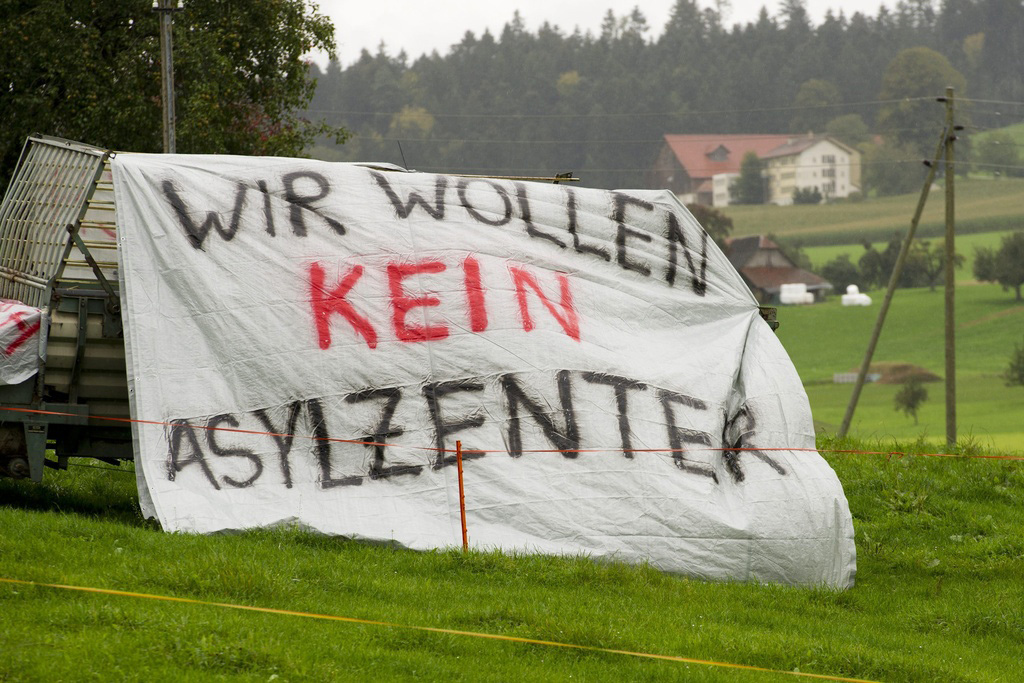
Search continues for suitable asylum shelters

Efforts to house growing numbers of asylum seekers are proving problematic despite a national push to tackle the issue.
Justice Minister Simonetta Sommaruga has mooted an amendment to the zoning laws and plans for an emergency concept to ease the shortage of accommodation for people applying for asylum in Switzerland.
Despite agreement in principle between the federal and cantonal authorities, it has become apparent that plans to create additional capacities for 2,000 asylum seekers by the end of the year may run into difficulties.
To date only a site for about 50 people has been pledged by the cantons, which enjoy a high degree of autonomy.
In an interview with the Neue Zürcher Zeitung newspaper Sommaruga last week admitted that the search for accommodation had been more difficult than expected. But she said the cantons had identified several buildings which would be examined more closely.
“The federal authorities and cantons agree that we urgently need more places at short notice. But there are legal hurdles. In the medium term we need changes to the zoning laws,” she said a few days later.
It turned out that military sites suggested as temporary asylum homes cannot be adapted or used for the purpose as they are situated in areas legally classified as non-residential.
Opposition
Often there is also local resistance against an asylum centre, with concerns about social tensions and claims about crime. Local authorities also criticise a lack of information between local, cantonal and federal authorities.
Hans-Jürg Käser, head of canton Bern’s police department, says he often does not understand why individual cantons and communes put up opposition, although he admits the issue is a thorny one.
“There is a cold wind blowing when I broach the subject with local councils,” he told the Neue Luzerner Zeitung newspaper.
Käser, apparently the only cantonal representative to put forward a site for an asylum accommodation, called on communes to take advantage of the federal government’s offer to pay the running costs of such shelters.
At a meeting between of heads of cantonal police departments on Thursday, Sommaruga announced plans to set up an emergency programme on behalf of the cantons.
However, she declined to give details saying the cantons had to be consulted first.
More asylum requests
Earlier this week the Federal Migration Office released the latest data on asylum requests.
In October, 2,142 people sought refuge in Switzerland for humanitarian reasons, an increase of nearly five per cent on the previous month. Most applicants came from Tunisia, Eritrea and Nigeria.
So far this year, 17,450 people have handed in asylum applications, up 12 per cent compared with the total number of requests for last year.
Sommaruga said she expected an increase of between 30-50 per cent by the end of this year, also a result of the upheaval in North African countries.
The announcements prompted renewed calls by the rightwing Swiss People’s Party for the government to take a tough line and insist on the implementation of the existing law as well as a further toughening of regulations.
Sommaruga for her part said she pledged she would not hesitate to break taboos and take the necessary action to improve asylum policy.
Referring to the preamble to the Swiss constitution, she said a society was judged by its attitude towards its weaker members.
“This is also the yardstick for my policy approach,” she told the NZZ newspaper.
Number of applications according to the Federal Migration Office:
2007: 10,844
2008: 16,606
2009: 16,005
2010: 15,567
October 2011: 17,450
Immigration and asylum are among the most controversial political topics in Switzerland.
While the rightwing People’s Party has been pushing for stricter asylum rules, the centre-left argues Switzerland must not violate humanitarian principles.
The latest amendments came into force in 2007.
Switzerland signed up to the Dublin asylum agreement in 2008 regulating the asylum proceedings among nearly 20 European states.
The federal authorities are responsible for asylum proceedings, but it is up to the country’s 26 cantonal authorities, which enjoy considerable autonomy, to implement the policy.
The justice ministry proposed setting up national centres to speed up the asylum procedure.

In compliance with the JTI standards
More: SWI swissinfo.ch certified by the Journalism Trust Initiative
















![The four-metre-long painting "Sonntag der Bergbauern" [Sunday of the Mountain Farmers, 1923-24/26] had to be removed by a crane from the German Chancellery in Berlin for the exhibition in Bern.](https://www.swissinfo.ch/content/wp-content/uploads/sites/13/2025/12/01_Pressebild_KirchnerxKirchner.jpg?ver=cb688ed5)















You can find an overview of ongoing debates with our journalists here . Please join us!
If you want to start a conversation about a topic raised in this article or want to report factual errors, email us at english@swissinfo.ch.